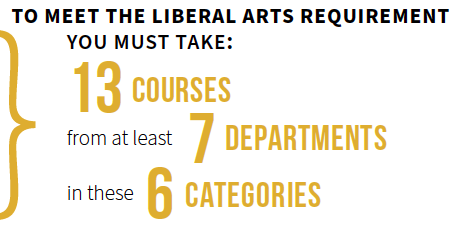AXLE Requirements
What is AXLE? | Requirement Overview | The Writing Requirement | The Liberal Arts Requirement | Proficiency and Placement
AXLE (Achieving eXcellence in Liberal Education) is the College of Arts and Science’s core curriculum. As you fulfill the AXLE requirements, you’ll encounter new subjects, learn to make connections across disciplines, and develop fundamental, life-long skills that will prepare you to succeed in today’s increasingly global and interconnected world.
Requirements Overview
The AXLE curriculum consists of 42-45 credit hours, roughly one-third of the total credit hours required for graduation. Studies for your major will make up another third, and electives will fulfill the rest. AXLE consists of two primary components: the Writing Requirement and the Liberal Arts Requirement.
The Writing Requirement has four parts:
- Demonstration of basic skills in English Composition
- First-Year Writing Seminar
- Completion of a W course of any level no later than the fourth semester in residence
- Completion of either a second W course of any level OR an approved CMST course OR an approved course in oral communications
To satisfy the Liberal Arts Requirement, you must complete thirteen courses across six areas of inquiry. The First-Year Writing Seminar, all 100-level and 200-level W courses, and all approved oral communications courses also count toward the thirteen-course Liberal Arts Requirement.
AXLE liberal arts courses must be distributed as follows:
- HCA: Humanities and the Creative Arts (three courses)
- INT: International Cultures (three courses)
- US: History and Culture of the United States (one course)
- MNS: Mathematics and Natural Sciences (three courses)
- SBS: Social and Behavioral Sciences (two courses)
- P: Perspectives (one course)
The Writing Requirement
The Writing Requirement has three parts.
English Composition
Regardless of your major, strong writing skills are essential for you to succeed at Vanderbilt. Effective written communication will also serve you in any career path you choose, helping you to communicate your thoughts in a thoughtful, organized, and convincing manner.
To satisfy the AXLE Writing Requirement, you must start by demonstrating competency in English composition, either by completing English 1100 in your first semester at Vanderbilt or by scoring appropriately on an approved placement test.
The following placement test scores will allow you to bypass English 1100:
- SAT score of at least 660 on the Evidence-Based Reading and Writing section, with a minimum score of 27 on the Reading section and a minimum score of 28 on the Writing and Language section
- ACT score of at least 30 on the English portion
- AP score of at least 4 on the English Language or English Literature exam
- IB score of at least 6 on the higher-level English exam
- Transfer credit for English 1100, 1210W, 1220W, 1230W, 1250W, 1260W, 1270W, or 1300W
First-Year Writing Seminar
You must take a First-Year Writing Seminar in either your first or second semester at Vanderbilt.
The First-Year Writing Seminar is an intimate, interactive course where you will be encouraged to participate actively in class discussions. You will learn to approach writing as a process, in which feedback and revisions are as welcome and important as creativity. By participating in challenging levels of dialogue, research, and writing, you will learn to:
- Brainstorm new ideas
- Do the research to support those ideas; and
- Craft written assignments that present and support your arguments in a coherent way.
The College of Arts and Science offers numerous First-Year Writing Seminars across many departments and topics. First-Year Writing Seminars also count toward the Liberal Arts requirement for the relevant category. For example, a First-Year Writing Seminar offered by the Department of Physics may also count toward the Mathematics and Natural Sciences requirement. All First-Year Writing Seminars are numbered 1111 in the course catalog and in YES.
Additional Writing Requirements
To satisfy the AXLE Writing Requirement, you must complete two additional courses:
- A W course at any level. You must complete this course by the end of your fourth semester at Vanderbilt.
- A second W course at any level or an approved upper-level oral communication course. You must complete this course prior to graduation.
These courses will provide regular assignments and feedback to help hone the communication skills most appropriate to your chosen major. Please see the course catalog or YES for course options. If you are uncertain whether a particular course satisfies the AXLE Writing Requirement, please speak with your adviser.
The Liberal Arts Requirement
AXLE’s Liberal Arts Requirement will introduce you to multiple subject areas, giving you a broad understanding of many topics and the chance to develop a range of skills that will equip you to succeed in our constantly changing world. To fulfill the liberal arts requirement, you must take 13 courses from at least 7 different departments, across the 6 categories described below.
Humanities and Creative Arts (HCA): 3 courses
Courses in the humanities and the creative arts will challenge you to examine your personal understanding of life and how your individual experiences overlap with those of the rest of humankind. These courses explore how people think, form values, confront ambiguity, express spiritual and creative yearnings, and grapple with moral and ethical problems.
International Cultures (INT): 3 courses + foreign language proficiency
The study of international cultures and foreign languages will prepare you to navigate our increasingly interconnected, global society. Courses include international history and cultural studies, literature, film studies, the social sciences, art, music, and languages.
Of the three courses in this category, at least one must be a second-semester or higher language-acquisition class taught at Vanderbilt, unless you can demonstrate similar proficiency through testing. If you demonstrate proficiency through testing, you must still complete three approved INT courses to satisfy the international cultures requirement. Depending on your circumstances, you may use certain standardized tests or the Tennessee Language Center Test to demonstrate proficiency or to satisfy prerequisites for higher-level language courses. Please see the CASPAR Proficiency and Placement page for information about minimum test scores and other details related to foreign language proficiency and placement.
You may satisfy one international cultures course requirement by completing a pre-approved study-abroad program of at least six weeks’ duration. Please check with your adviser or the Global Education Office (GEO) for a list of approved programs.
Mathematics and Natural Sciences (MNS): 3 courses, including 1 with a lab
Mathematics courses will train you to interact in a precise way with complex or abstract ideas. Natural science courses will help you understand the complex interactions between science, technology, and society; apply scientific principles to everyday experience; and develop the ability to distinguish between science and what masquerades as science.
As part of the three required courses in this category, one must include a lecture and a lab combination. The exact courses you take will depend on your background, test scores, planned major/career, and other factors. Please see the CASPAR Calculus Placement and Chemistry Placement pages for detailed information about math and science placement, and speak with your adviser for assistance in choosing appropriate courses.
Social and Behavioral Sciences (SBS): 2 courses
This requirement teaches students how humans and societies function, including studying human behavior at the levels of individuals, their interactions with others, their societal structures, and their social institutions. The remarkable scope represented by these disciplines extends from studying the underpinnings of brain function to the dynamics of human social groups and the structures of political and economic institutions.
History and Culture of the United States (US): 1 course
This category provides students with a foundational understanding of the American experience and the shaping of American values and viewpoints within the context of an increasingly global society. Interpreting history and culture in the broadest sense, options in this category include traditional history and cultural studies courses, plus literature, film, social science, art, and music courses that illuminate historical periods or cultural themes in U.S. history.
Perspectives (P): 1 course
The perspectives requirement prepares students to serve as compassionate leaders, effective problem-solvers, and productive citizens in a diverse world. Courses in this category give significant attention to individual and cultural diversity; multicultural interactions; sexual orientation; and gender, racial, ethical, and religious issues within or between cultures.
